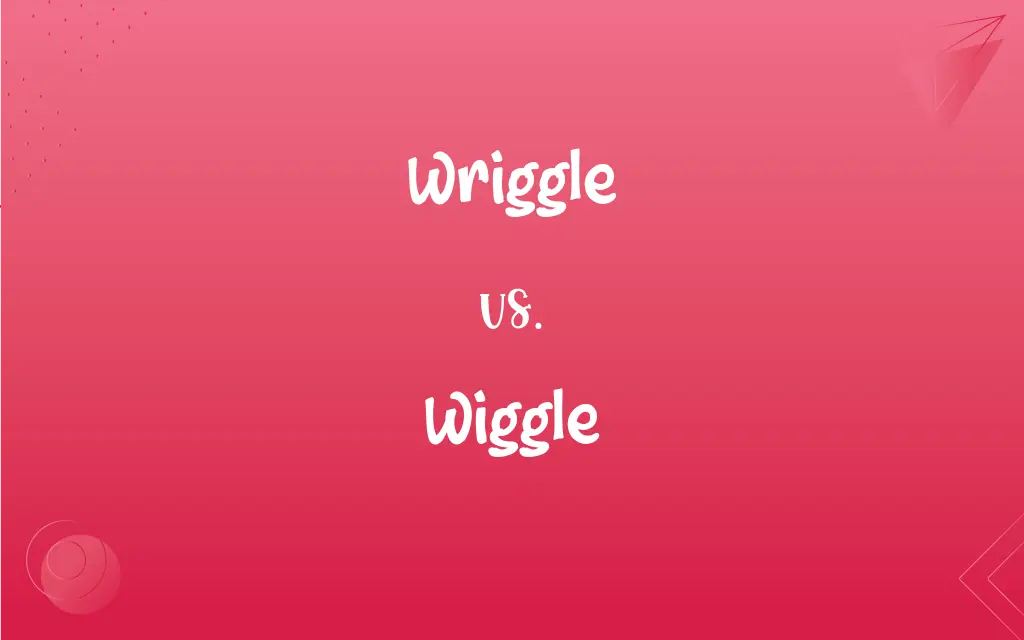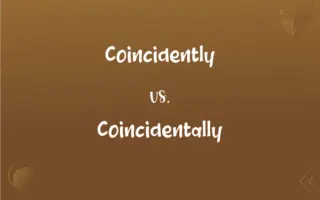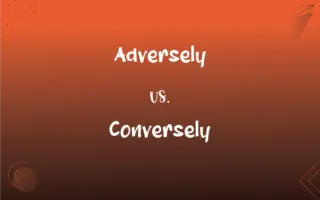Wriggle vs. Wiggle: What's the Difference?
Edited by Aimie Carlson || By Janet White || Updated on March 4, 2024
Wriggle implies a twisting or turning motion often used to escape or free oneself, suggesting struggle or effort. Wiggle refers to a back-and-forth movement, typically without the connotation of escaping, emphasizing flexibility or playfulness.

Key Differences
Wriggle is often used to describe a movement involving twisting or turning motions, particularly in a context where the intent is to escape, adjust, or free oneself from a confined space or situation. This term conveys a sense of effort or struggle, as when someone wriggles out of a tight spot or when a worm wriggles in the soil. On the other hand, wiggle denotes a simpler, more playful back-and-forth motion, like a dog wiggling its tail or a person wiggling their toes. This movement suggests flexibility and is often used in lighter, less constrained contexts.
The connotation of wriggle often implies a purposeful action, aiming towards achieving a specific outcome, such as wriggling free from a restraint. It suggests a more complex series of movements compared to wiggle, which is generally more about the movement itself than the outcome. Whereas, wiggle is frequently used to describe movements that are free-form, without a direct implication of trying to escape or adjust; it's more about the act of moving in a playful or casual manner.
In the animal kingdom, the difference is evident in how creatures move. For instance, a fish might wriggle when caught in a net, exhibiting a frantic effort to escape, while the same fish might wiggle its fins gently while swimming leisurely. This distinction highlights how context and intent influence the choice between wriggle and wiggle.
Wriggle can also imply a degree of discomfort or the need to adjust one's position, as when someone wriggles in their seat to find a comfortable sitting position. This usage suggests an attempt to alleviate discomfort or adjust to a better state. Conversely, wiggle often carries a lighter, more playful connotation, such as when describing someone wiggling their eyebrows in a humorous gesture, without any implication of discomfort or the need for adjustment.
Despite their differences, both wriggle and wiggle describe movements that are non-linear and involve some form of back-and-forth or twisting action. The choice between the two often depends on the context of the movement, the intent behind it, and the overall tone one wishes to convey.
ADVERTISEMENT
Comparison Chart
Connotation
Effort, struggle, escape
Playfulness, flexibility, casual movement
Movement Type
Twisting, turning
Back-and-forth
Typical Context
Tight spaces, discomfort, escaping situations
Leisurely movement, playful actions
Intent
Purposeful, aiming to free oneself or adjust
Casual, often without a specific goal
Examples
Wriggling out of a tight spot, a worm wriggling
Wiggling toes, a dog's wagging tail
ADVERTISEMENT
Wriggle and Wiggle Definitions
Wriggle
To twist or turn with quick movements, especially to free oneself.
The child wriggled out of her mother's grasp.
Wiggle
Often used in light, non-serious contexts.
He wiggled his eyebrows in a funny gesture.
Wriggle
Suggests a struggle or effort.
She wriggled to maintain her balance on the slippery surface.
Wiggle
Describes casual, often repetitive movements.
The jelly wiggled on the plate as she laughed.
Wriggle
Describes effortful movement in confined spaces.
The mouse wriggled through the narrow gap.
Wiggle
A playful or gentle back-and-forth movement.
The puppy wiggled its tail excitedly.
Wriggle
To turn or twist the body or a body part with writhing motions
The rabbit's nose wriggled.
Wiggle
Implies flexibility and ease.
She wiggled her fingers to the music.
Wriggle
To move or proceed with writhing motions
Wriggle into a sleeping bag.
Wriggled out of his grasp.
Wiggle
To move back and forth with quick irregular motions
The gelatin wiggled on the plate.
Wriggle
To move with a wriggling motion
Wriggle a toe.
Wiggle
To move or proceed with a twisting or turning motion; wriggle
Wiggled restlessly in her chair.
Wiggled through the crowd.
Wriggle
To make (one's way, for example) by or as if by wriggling
He wriggled his way into her good graces.
Wiggle
To insinuate or extricate oneself by sly or subtle means
Wiggled out of a social engagement.
Wriggle
A wriggling movement.
Wiggle
To cause to move back and forth with quick irregular motions
Wiggle a loose tooth.
Wriggle
(intransitive) To twist one's body to and fro with short, writhing motions; to squirm.
Teachers often lose their patience when children wriggle in their seats.
Wiggle
To make (one's way, for example) by or as if by wiggling
The pitcher wiggled his way out of a jam.
Wriggle
(transitive) To cause something to wriggle.
He was sitting on the lawn, wriggling his toes in the grass.
Wiggle
A wiggling movement or course.
Wriggle
(intransitive) To use crooked or devious means.
Wiggle
To move with irregular, back and forward or side to side motions; To shake or jiggle.
Her hips wiggle as she walks.
The jelly wiggles on the plate when you move it.
Wriggle
A wriggling movement.
Wiggle
(figurative) An alternating state or characteristic. en
Wriggle
To move the body to and fro with short, writhing motions, like a worm; to squirm; to twist uneasily or quickly about.
Both he and successors would often wriggle in their seats, as long as the cushion lasted.
Wiggle
To move to and fro with a quick, jerking motion; to bend rapidly, or with a wavering motion, from side to side; to wag; to squirm; to wriggle; as, the dog wiggles his tail; the tadpole wiggles in the water.
Wriggle
To move with short, quick contortions; to move by twisting and squirming; like a worm.
Covetousness will wriggle itself out at a small hole.
Wriggling his body to recoverHis seat, and cast his right leg over.
Wiggle
Act of wiggling; a wriggle.
Wriggle
Wriggling; frisky; pliant; flexible.
Wiggle
The act of wiggling
Wriggle
Act of wriggling; a short or quick writhing motion or contortion.
Wiggle
Move to and fro;
Don't jiggle your finger while the nurse is putting on the bandage!
Wriggle
The act of wiggling
Wiggle
Can denote adjusting position, but without a sense of struggle.
Wiggle your toes to feel more comfortable in the new shoes.
Wriggle
To move in a twisting or contorted motion, (especially when struggling);
The prisoner writhed in discomfort
The child tried to wriggle free from his aunt's embrace
Wriggle
Often implies discomfort or the need to adjust.
He wriggled in his chair during the long flight.
Wriggle
Used in contexts requiring escape or relief.
The fish wriggled free from the net.
FAQs
What does wiggle mean?
Wiggle denotes a back-and-forth movement that's typically playful, flexible, or casual, without implying escape or discomfort.
Can wriggle and wiggle be used interchangeably?
While they can sometimes be used in similar contexts, their connotations differ—wriggle implies effort or discomfort, whereas wiggle is more about playful movement.
Is wriggling always a sign of discomfort?
Often, but not always. It can also indicate an effort to adjust or escape, not solely discomfort.
When is it appropriate to use wriggle in writing?
Use wriggle when describing movements involving effort to escape, adjust, or when implying a degree of discomfort.
What does wriggle mean?
Wriggle refers to twisting or turning movements, often made to escape, adjust, or free oneself from a tight or uncomfortable situation.
What is a synonym for wriggle?
Squirm is a close synonym, also implying twisting movements often due to discomfort.
Why might an animal wiggle?
Animals might wiggle as part of a casual or instinctual movement, such as expressing joy or engaging in playful behavior.
Can objects wiggle?
Yes, objects can wiggle if they move back-and-forth, often as a result of external forces, like a wiggling plate of jelly.
What part of speech are wriggle and wiggle?
Both wriggle and wiggle primarily function as verbs, describing types of movement. They can also be used as nouns to describe the action itself.
What is a synonym for wiggle?
Jiggle can be a synonym, especially for gentle, repetitive movements.
Is wriggling a common behavior in all animals?
Many animals exhibit wriggling behavior, especially when trying to navigate through tight spaces or escape from a predator.
In what situations might someone prefer to wiggle rather than wriggle?
Someone might prefer to wiggle when adjusting their position for comfort without the implication of being stuck or uncomfortable, such as adjusting seating or making small movements to music.
When should I use wiggle instead of wriggle?
Use wiggle when describing light-hearted, flexible, or casual movements, especially when the context is playful or non-serious.
Is there an age where wiggling is more common in children?
Young children and toddlers often wiggle frequently, as part of exploratory behavior and due to their high energy levels and developing motor skills.
Does the intensity of the movement affect whether to use wriggle or wiggle?
Yes, wriggle often suggests more intense or purposeful movement, while wiggle implies a lighter, less intense motion.
Can wriggle be used metaphorically?
Yes, wriggle can be used metaphorically to describe someone trying to escape a difficult situation, not just physically but also in terms of arguments or uncomfortable social situations.
How do cultural perceptions of wriggling and wiggling differ?
Cultural perceptions can vary, with some cultures viewing these movements as part of expressive body language, while others might see them as indicative of restlessness or impatience.
Can wriggle have a positive connotation?
While often associated with effort or discomfort, wriggle can have a positive connotation when it signifies successfully escaping or adjusting to a better situation.
How do wriggle and wiggle relate to dance?
In dance, wiggle is often used to describe loose, rhythmic movements, whereas wriggle might be used for movements that suggest breaking free or expressing more intense physical effort.
Can humans wiggle their ears?
Some people can wiggle their ears voluntarily, using muscles around the ear to create this playful movement.
About Author
Written by
Janet WhiteJanet White has been an esteemed writer and blogger for Difference Wiki. Holding a Master's degree in Science and Medical Journalism from the prestigious Boston University, she has consistently demonstrated her expertise and passion for her field. When she's not immersed in her work, Janet relishes her time exercising, delving into a good book, and cherishing moments with friends and family.
Edited by
Aimie CarlsonAimie Carlson, holding a master's degree in English literature, is a fervent English language enthusiast. She lends her writing talents to Difference Wiki, a prominent website that specializes in comparisons, offering readers insightful analyses that both captivate and inform.































































